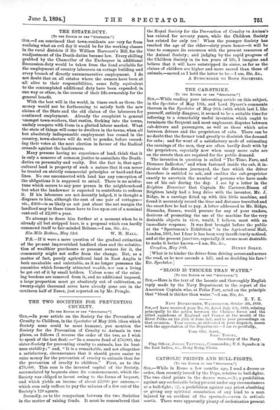THE CAB-STRIKE.
ITo TES EDITOR or THE "SPECTATOR."] Sin,—While reading your interesting article on this subject, in the Spectator of May 19th, and Lord Dysart's comments thereon in the Spectator of May 26th (with which last I, like yourself, entirely disagree), it seemed to be a suitable time for referring to a remarkably useful invention which ought to terminate the frequent and most unpleasant disputes between cab-drivers and passengers, as well as those which arise between drivers and the proprietors of cabs. There can be no doubt that the former tend greatly to diminish the demand for cabs; and for want of a satisfactory mode of estimating the earnings of the men, they are often hardly dealt with by the proprietors, especially now when many more cabs are on the streets than are required for the public demand.
The invention in question is called "The Time, Fare, and Distance Indicator," and when fastened inside the cab, it in- dicates the distance journeyed, the fare which the driver therefore is entitled to ask, and enables the cab-proprietor exactly to ascertain the number of persons who have made use of his cab during the day. I see by a letter in the Brighton Examiner that Captain De Carteret-Bisson. of Brighton lately had a long drive with the inventor, Mr. j. Ridge, in a carriage fitted up with this little machine, and found it accurately record the time and distance travelled and the exact fare he had to pay. A letter addressed to Mr. Ridge, Hassocks, Sussex, would procure for any of your readers, desirous of promoting the use of the machine for the very desirable objects in view, would, I believe, meet with an immediate response. It was first brought before the public at the "Sportsman's Exhibition" in the Agricultural Hall, London, 1891, but I fear it has been very insufficiently noticed, and at the present juncture, especially, it seems most desirable to make it better known.—I am, Sir, &c., [What is to hinder the driver from driving across and across the road, as he now ascends a hill, and so doubling his fare ? ED. Spectator.]






































 Previous page
Previous page